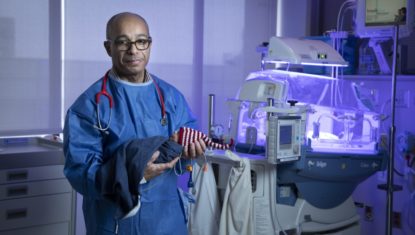28/06/2022
Ottawa, Ontario — Tuesday June 28, 2022

Over the past year, patience and keeping an eye on the prize has been the name of the game for Dr. Bernard Thébaud, team captain of the Biology Breakthrough Team.
Dr. Thébaud, neonatologist and Senior Scientist at the CHEO Research Institute and The Ottawa Hospital, has been preparing to launch a phase 1 clinical trial of an experimental mesenchymal stem cell (MSC) therapy that may help heal the lungs of premature babies and prevent a common chronic condition called bronchopulmonary dysplasia (BPD). Dr. Thébaud and his team are the only group in Canada working with mesenchymal stromal cells in pediatrics.
“I’m not usually a patient person, it drives me nuts; but the devil is in the details. The preparation for a clinical trial is super important. In the beginning I thought I was losing time and I wanted to start right away, but in order to get it right you have to do your homework first. Once you’re truly ready, then launch it,” said Dr. Thébaud.
In September 2021, his team completed the observational arm of the study, which sought to see how such a trial would unfold. The “mock trial” went through the exact same inclusion and exclusion criteria, tested out recruitment materials and parent information (including an animated video), and helped refine their approach for the upcoming interventional trial.
“A lack of enrolment is one of the main reasons that a clinical trial fails,” he said. “Integrating families and parents especially early on in the study increases the quality of the trial and the likelihood of completion. We learn a lot from parents. What appears important to physicians or the treatment team may not be important for parents, especially when it comes to clinical trials and expectations of outcomes.”
What exactly is an MSC?
Another aspect of preparation and patience that has been a focus of 2021 for Dr. Thébaud is helping the scientific community define MSCs and agree upon clinical reporting guidelines to reduce controversy and enhance transparency and successful clinical translation.
“You’d think we would already have a clear definition and defined characteristics for MSC’s, but we don’t. Cell therapy for regenerative purposes is still in its infancy. Basic scientists and cell therapists speak two different languages when it comes to MSCs, which makes it impossible to compare clinical studies,” he said.
In 2021, a first-ever scoping review was completed and a 25-member core group was established in preparation for an upcoming Delphi study to come up with a consensus on the definition and characteristics of MSCs (Leresme et al. Stem Cells Transl Med 2022). The Delphi method is a process used to arrive at a group opinion or decision by surveying a panel of experts. Experts respond to several rounds of questionnaires, and the responses are aggregated and shared with the group after each round.
Next steps
“With all of this preparation complete, and having received Health Canada approval in December 2021, Dr. Thébaud anticipates launching the phase 1 clinical trial at The Ottawa Hospital in the summer of 2022, with neonatal follow-ups taking place at CHEO for a number of years following.
“I hope that for this specific phase 1 trial, we will show the safety and feasibility for this new cell therapy so we can move onto a phase 2 trial. Ultimately what I hope for these cells is they will have a positive impact on the respiratory and neuro-development of babies,” said Dr. Thébaud.
The last major breakthrough in neonatology was the discovery of pulmonary surfactant in 1990.
“In our lab we are currently working on three breakthroughs. This is super exciting! When I see how much effort it is to take MSCs into the clinic and I want to repeat that in two others, it’s a lot of work and takes a lot of time, but it’s definitely worth it.”
Read the full 2021-2022 CHEO Research Institute Annual Report.
Photo credit: The Ottawa Hospital
